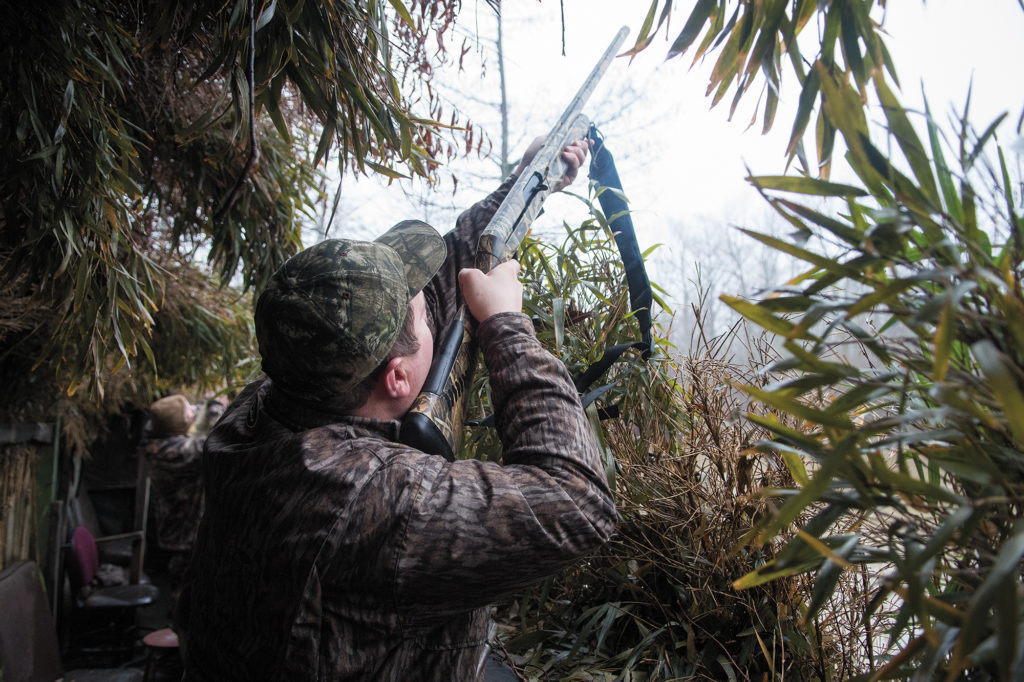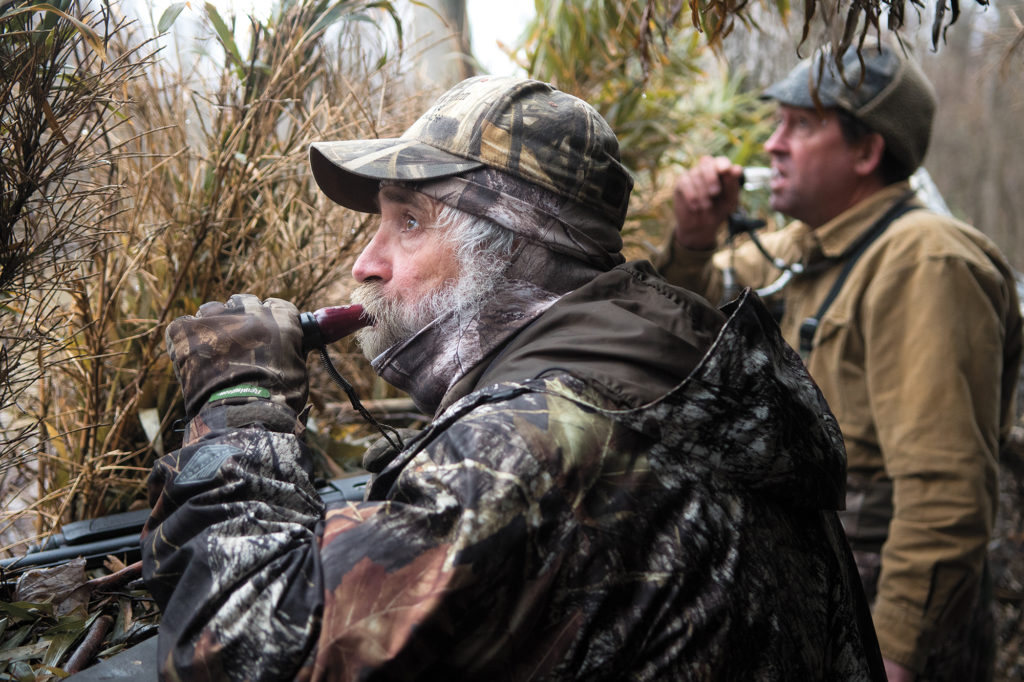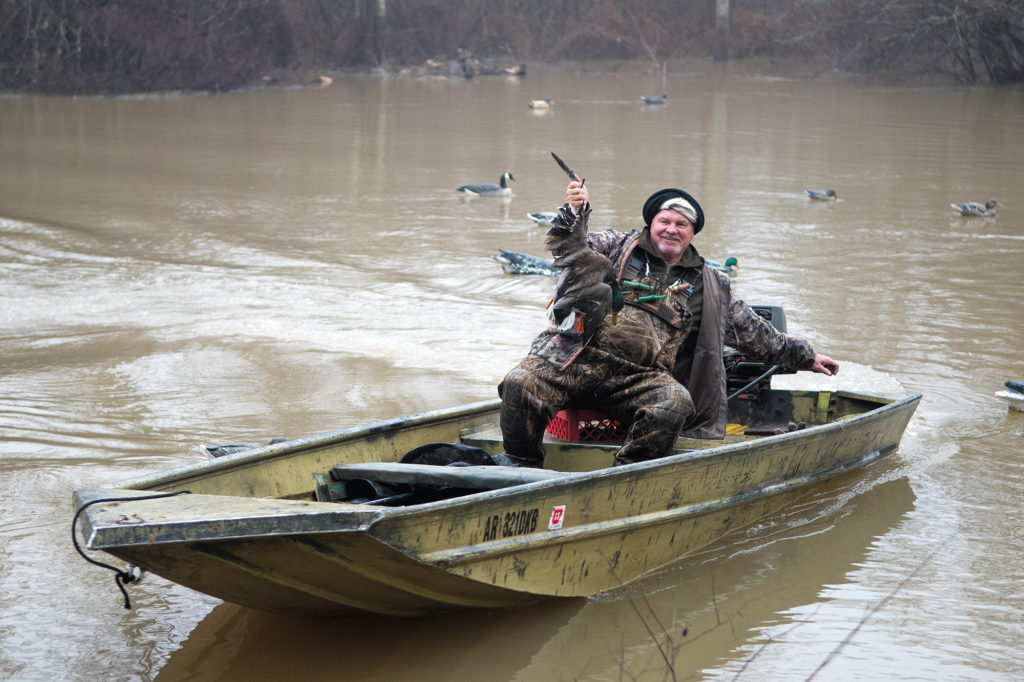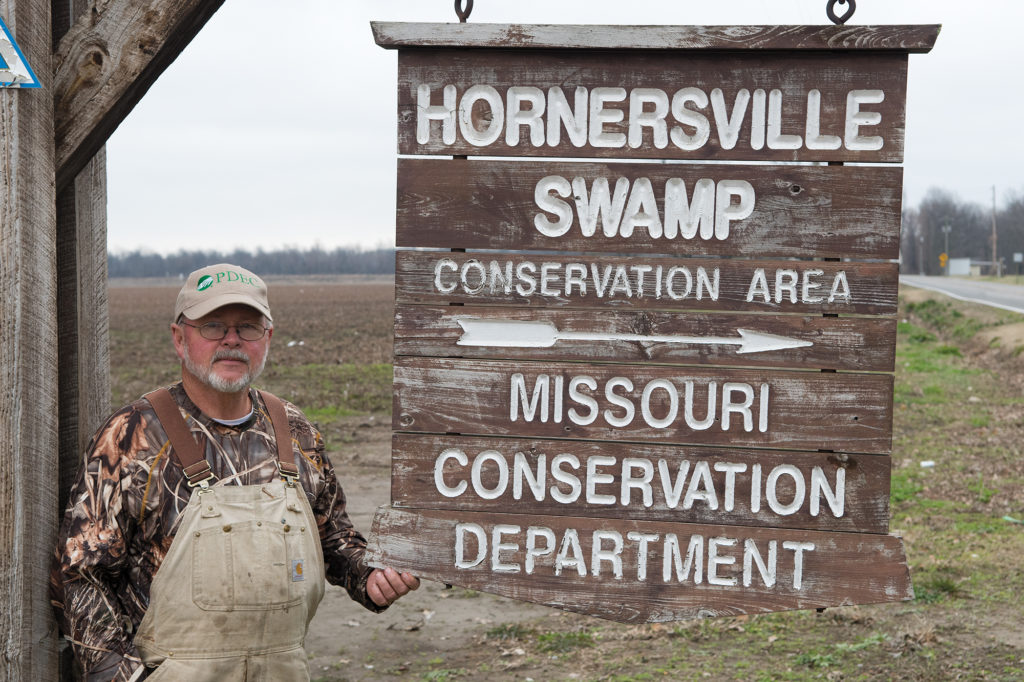
It’s duck season in Missouri’s most southern point. The weatherman has promised a miserable January day with wind and rain in the forecast. But for these men, there is no place in the world they would rather be. It’s 6 in the morning and the sun has yet to make an appearance in the sky. On the banks of the St. Francis River deep in the Missouri Bootheel, two boats patiently wait on a ramp at the water’s edge near Cardwell.
William “Bub” Foresythe deftly casts off one of the boats while stepping in with a practiced move that keeps his boots dry. Then he hangs on for dear life as his son-in-law, Josh Beasley, fires up the outboard. Josh idles the boat down a dark channel with nothing but a handheld spotlight to guide the way. Once the motor warms up, he cranks the throttle to full power and the reason for Foresythe’s death grip becomes apparent.
Beasley knows the way through this waterway in “Swampeast Missouri” like the back of his hand thanks to 30 years of duck hunting here. He nimbly guides the boat past branches hanging low from the dripping cypress and tupelo trees. He knows just when to throttle down to glide over a sunken log and when to turn in this dark, twisting course to the duck blind.
Suddenly, decoys appear in the water and Beasley idles the boat behind a duck blind built when the water level was low. Today, it’s partially in the water, a reminder that just a few days ago heavy rain had it flooded.
Soon, another boat appears hauling Beasley’s father, Harvey. With him are Clay Bullard, a lawyer from Kennett, and Clint McGowan, who lives in Arkansas.

The hunters quickly find a place in the muddy blind, which is made of plywood and canvas. The blind has been brushed in with cypress limbs and cane. Seats from an old school bus offer a place to rest, but the hunters choose instead to stand and peer out through gaps in the camouflage.
Patience, it turns out, is a large part of duck hunting, especially on an overcast day. Ducks could be flying directly overhead, but visibility is so poor no one can tell. After a half-hour wait, the stories begin. The hunters gathered here are veterans of many days in the duck blinds, and as the tall tales start, it’s a good thing everyone is wearing their waders.
“Tell about your crow dog,” Bullard said to Harvey Beasley.
Reluctantly, Harvey tells the tale of a retriever so good that he would fetch not only ducks but also crows, as directed by his master.
Shaking his head sadly, Bullard offers to tell the real story, as only a country lawyer can. In his version, Harvey’s dog swam out to retrieve a duck, but spit it out and instead retrieved a dead crow that was floating on the water.
Before Harvey can respond, a flurry of wings overhead causes everyone to reach for the duck calls hanging from lanyards around their necks. A chorus of manmade quacks echoes across the duck pond, but this flock isn’t interested. All goes quiet again as it becomes apparent the quarry has moved on.
And so it goes: long periods of waiting, punctuated by adrenaline-fueled efforts to call in the ducks. Finally, a mallard drake makes a fatal mistake, hovering 50 feet above the pond. Instantly, the shotguns come up and fire as one. The bird crashes to the water, and Harvey volunteers to retrieve it, grinning from ear to ear. No one cares whose bird it is.
This would be the only duck shot that morning, but no one in the blind seemed to mind. Duck hunting is more about getting into the woods than bringing home a full limit.

“It’s more about fellowship and being out watching the deer and the ducks,” said Josh Beasley, who operates a guide service called Delta Dynasty. “It runs in your blood. When you’ve got those mallards coming in on you, it’s a one-of-a-kind thing. Really, you don’t even need to have a gun. Just knowing I can call them down is enough.”
He was just 4 years old when his father took him on his first duck hunt. “I had a BB gun, and he would let me shoot at the decoys,” Josh recalled. “I was ready to go.”
A few years later, he moved up to a single-shot .410 shotgun and has been hunting consistently since he was 14. Since then, Josh has missed only three seasons when he was deployed to Iraq and Afghanistan as a bomb technician with the Arkansas National Guard. These days, he’s likely to spend as much as 55 days of the 60-day season guiding or hunting.
He said there is a distinct advantage to hunting with a guide service like the one he operates. “To get started, it is an expensive sport,” Josh said. “I have a $4,000 boat and a $1,500 gun. Decoys are $150 a dozen, and I own about a thousand. Or you can go with me for $125 and call it good.”
Hunting on private land like the 160 acres Josh has beats hunting on public land, he said. While Missouri has plenty of public areas open to duck hunters, he says decoys can’t be left in the water on public land, and it’s likely there will be crowds of hunters fighting over the same flock.
Besides providing equipment and taking hunters to the ducks, Josh and Foresythe together own a number of houses that are used as duck lodges by hunters who come from as far away as Chicago. Foresythe, who is mayor of Hornersville and a director for Pemiscot-Dunklin Electric Cooperative in Hayti, Missouri, sees ducks as a way to add much-needed income in one of the state’s poorest counties.

“When the cotton gins shut down and the farming is done, the cafes here are dead,” he said. “I mean, there is nobody in town. We used to have businesses that would close in winter because there was nothing going on. This right here has really been a shot in the arm.”
Besides Foresythe and Josh Beasley, at least five others now provide lodging for duck hunters in Hornersville. A closed bank building has been converted into a duck lodge. The American Legion hosts duck suppers for hunters, and area churches also help feed visitors in order to make them feel welcome.
When Foresythe became mayor, he took a good look at the resources on which Hornersville could build. He didn’t have to look far. A stone’s throw from his office in city hall is the Hornersville Swamp Conservation Area that provides access to five major ditches that are part of the Little River Drainage District.
This network of waterways drained what once was a huge swamp, transforming the Bootheel into productive farmland. It also created a paradise for ducks and geese. The mayor plans to use these natural resources to improve the economy.
When the weather moderates, he plans to start a swamp tour that will let visitors see the alien landscape that is so different from the rest of Missouri. Already, he has a long list of people who can’t wait for the tours to begin. He also brags on the trophy deer that frequent the levees.
Foresythe offers one other service that ensures duck hunters leave happy. He will pluck their ducks for a small fee.
“We see things shrinking here all the time, and we are just wanting to enhance all we can,” sais Foresythe , who as an electric cooperative director takes seriously his “concern for community,” the seventh principle on which cooperatives operate. “I just hope this duck plucking and lodging and this and that will help. And it has. The last few years, it really has.”
Jim McCarty is editor of Rural Missouri magazine.